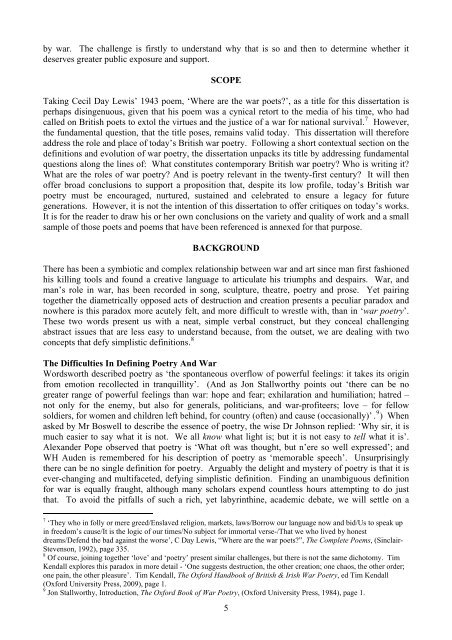Where are the war poets? - Defence Academy of the United Kingdom
Where are the war poets? - Defence Academy of the United Kingdom
Where are the war poets? - Defence Academy of the United Kingdom
Create successful ePaper yourself
Turn your PDF publications into a flip-book with our unique Google optimized e-Paper software.
y <strong>war</strong>. The challenge is firstly to understand why that is so and <strong>the</strong>n to determine whe<strong>the</strong>r it<br />
deserves greater public exposure and support.<br />
SCOPE<br />
Taking Cecil Day Lewis’ 1943 poem, ‘<strong>Where</strong> <strong>are</strong> <strong>the</strong> <strong>war</strong> <strong>poets</strong>’, as a title for this dissertation is<br />
perhaps disingenuous, given that his poem was a cynical retort to <strong>the</strong> media <strong>of</strong> his time, who had<br />
called on British <strong>poets</strong> to extol <strong>the</strong> virtues and <strong>the</strong> justice <strong>of</strong> a <strong>war</strong> for national survival. 7 However,<br />
<strong>the</strong> fundamental question, that <strong>the</strong> title poses, remains valid today. This dissertation will <strong>the</strong>refore<br />
address <strong>the</strong> role and place <strong>of</strong> today’s British <strong>war</strong> poetry. Following a short contextual section on <strong>the</strong><br />
definitions and evolution <strong>of</strong> <strong>war</strong> poetry, <strong>the</strong> dissertation unpacks its title by addressing fundamental<br />
questions along <strong>the</strong> lines <strong>of</strong>: What constitutes contemporary British <strong>war</strong> poetry Who is writing it<br />
What <strong>are</strong> <strong>the</strong> roles <strong>of</strong> <strong>war</strong> poetry And is poetry relevant in <strong>the</strong> twenty-first century It will <strong>the</strong>n<br />
<strong>of</strong>fer broad conclusions to support a proposition that, despite its low pr<strong>of</strong>ile, today’s British <strong>war</strong><br />
poetry must be encouraged, nurtured, sustained and celebrated to ensure a legacy for future<br />
generations. However, it is not <strong>the</strong> intention <strong>of</strong> this dissertation to <strong>of</strong>fer critiques on today’s works.<br />
It is for <strong>the</strong> reader to draw his or her own conclusions on <strong>the</strong> variety and quality <strong>of</strong> work and a small<br />
sample <strong>of</strong> those <strong>poets</strong> and poems that have been referenced is annexed for that purpose.<br />
BACKGROUND<br />
There has been a symbiotic and complex relationship between <strong>war</strong> and art since man first fashioned<br />
his killing tools and found a creative language to articulate his triumphs and despairs. War, and<br />
man’s role in <strong>war</strong>, has been recorded in song, sculpture, <strong>the</strong>atre, poetry and prose. Yet pairing<br />
toge<strong>the</strong>r <strong>the</strong> diametrically opposed acts <strong>of</strong> destruction and creation presents a peculiar paradox and<br />
nowhere is this paradox more acutely felt, and more difficult to wrestle with, than in ‘<strong>war</strong> poetry’.<br />
These two words present us with a neat, simple verbal construct, but <strong>the</strong>y conceal challenging<br />
abstract issues that <strong>are</strong> less easy to understand because, from <strong>the</strong> outset, we <strong>are</strong> dealing with two<br />
concepts that defy simplistic definitions. 8<br />
The Difficulties In Defining Poetry And War<br />
Wordsworth described poetry as ‘<strong>the</strong> spontaneous overflow <strong>of</strong> powerful feelings: it takes its origin<br />
from emotion recollected in tranquillity’. (And as Jon Stallworthy points out ‘<strong>the</strong>re can be no<br />
greater range <strong>of</strong> powerful feelings than <strong>war</strong>: hope and fear; exhilaration and humiliation; hatred –<br />
not only for <strong>the</strong> enemy, but also for generals, politicians, and <strong>war</strong>-pr<strong>of</strong>iteers; love – for fellow<br />
soldiers, for women and children left behind, for country (<strong>of</strong>ten) and cause (occasionally)’ . 9 ) When<br />
asked by Mr Boswell to describe <strong>the</strong> essence <strong>of</strong> poetry, <strong>the</strong> wise Dr Johnson replied: ‘Why sir, it is<br />
much easier to say what it is not. We all know what light is; but it is not easy to tell what it is’.<br />
Alexander Pope observed that poetry is ‘What <strong>of</strong>t was thought, but n’ere so well expressed’; and<br />
WH Auden is remembered for his description <strong>of</strong> poetry as ‘memorable speech’. Unsurprisingly<br />
<strong>the</strong>re can be no single definition for poetry. Arguably <strong>the</strong> delight and mystery <strong>of</strong> poetry is that it is<br />
ever-changing and multifaceted, defying simplistic definition. Finding an unambiguous definition<br />
for <strong>war</strong> is equally fraught, although many scholars expend countless hours attempting to do just<br />
that. To avoid <strong>the</strong> pitfalls <strong>of</strong> such a rich, yet labyrinthine, academic debate, we will settle on a<br />
7 ‘They who in folly or mere greed/Enslaved religion, markets, laws/Borrow our language now and bid/Us to speak up<br />
in freedom’s cause/It is <strong>the</strong> logic <strong>of</strong> our times/No subject for immortal verse-/That we who lived by honest<br />
dreams/Defend <strong>the</strong> bad against <strong>the</strong> worse’, C Day Lewis, “<strong>Where</strong> <strong>are</strong> <strong>the</strong> <strong>war</strong> <strong>poets</strong>”, The Complete Poems, (Sinclair-<br />
Stevenson, 1992), page 335.<br />
8 Of course, joining toge<strong>the</strong>r ‘love’ and ‘poetry’ present similar challenges, but <strong>the</strong>re is not <strong>the</strong> same dichotomy. Tim<br />
Kendall explores this paradox in more detail - ‘One suggests destruction, <strong>the</strong> o<strong>the</strong>r creation; one chaos, <strong>the</strong> o<strong>the</strong>r order;<br />
one pain, <strong>the</strong> o<strong>the</strong>r pleasure’. Tim Kendall, The Oxford Handbook <strong>of</strong> British & Irish War Poetry, ed Tim Kendall<br />
(Oxford University Press, 2009), page 1.<br />
9 Jon Stallworthy, Introduction, The Oxford Book <strong>of</strong> War Poetry, (Oxford University Press, 1984), page 1.<br />
5

















